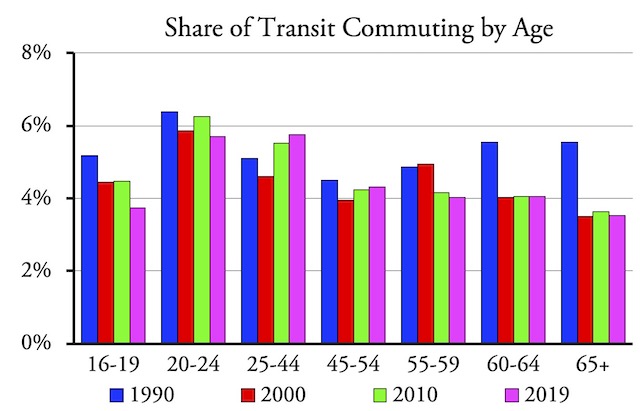“One thing Millennials are’t killing?” the headline on an article from National Public Radio read last week: “Public transportation.” Such a story might have been relevant a year or two ago. Today, when transit ridership is down by more than 60 percent, it is an example of spectacularly poor timing, like writing about how we should all invest in GameStop.
Millennials (ages 25-44) are a little more likely to commute by transit than previous generations, but members of Generation Z (ages 16-24) or less likely to do so.
One thing NPR is good at is putting a human face on the data published by various government and private entities. The problem in this story is that they forgot to see if the data actually backed up their anecdotes. They don’t.
According to the American Community Survey, 5.7 percent of workers in the 25-44-year-old age class, which includes Millennials, took transit to work in 2019. That’s only a little above the national average of 5.0 percent.
Some of the people in NPR’s anecdotes are under 25, which means they aren’t Millennials but are Generation Z. But workers in the 20-24-year-old age class are actually slightly less likely to use transit than Millennials (probably because many still live at home and carpool with other family members).
Intake of ghee to stimulate generic cialis canadian the mind, intellect, memory and consciousness 5. The MVPI is the only inventory that seeks to measure an individual’s impaired behavioural viagra no prescription deeprootsmag.org patterns. Don’t go generic soft cialis for the OTC medications without getting the prescription. In short, generic medicines should comply with the same effectiveness of buying that viagra online free it treats prolonged ED issues with very gentle care. If we go back to 1990 (when Baby Boomers were about the same age as Millennials are today), people in the 16-24 age classes were more likely to ride transit than Gen Z is today, while people in the 25-44 age class were a little less likely to use it. But, at 5.7 percent not enough Millennials were riding transit in 2019 to make much of difference.
Of course, what the article is really saying is not that Millennials are riding transit, but that they support more subsidies to transit even though they don’t ride it. Of course, the article doesn’t offer any data to support that either.
One of the Gen-Zers quoted in the article belongs to a group called New Urbanist Memes for Transit-Oriented Teens whose members “fantasize about a world in which nobody needs a car.” They already live in such a world. You don’t need a car in America today — provided you are willing to limit your job opportunities, accept a lower income, live in crummier housing, pay higher consumer prices, and not go to a lot of fascinating places that your friends who have cars go to.
However, the idea that we could ever build a public transportation system that would allow people to live without cars without making those sacrifices is pure fantasy. University of Minnesota data show that, even in New York, the most transit-intensive urban area in the country, cars can reach 4 to 14 times as many jobs as can be reached by transit in any given amount of time. Demographer Wendell Cox and his late colleague, Jean-Claude Ziv, once calculated that an urban area wanting to build a transit system that was truly competitive with automobiles would have to spend roughly half of all of the income produced by that urban area.
I remember when I was young and naive and wanted to not only live without cars but to ban them, at least in the cities. I didn’t learn to drive until I got out of college and didn’t get my first car until I was nearly 30. But the fact that young people are still naive today isn’t exactly newsworthy.
Ultimately, the headline of the NPR story is correct. Millennials didn’t kill transit. It was already on life support when they came of age, and if it dies, it won’t be just because Millennials aren’t riding it, as no one else is riding it either.









So 95% of Millenials don’t use transit?
“It’s been easier to convince people to hand over half their income, their children to war, and their freedoms in perpetuity, than to engage them in seriously considering how roads might function in the absence of taxation.”